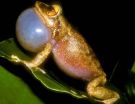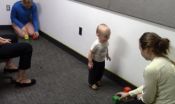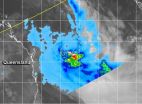(Press-News.org) Changes in the Puerto Rican climate over the past three decades have caused small but significant changes to the coqui frog, the territory's national animal. UCLA biologists have found that not only have male coquis become smaller, but their mating call has also become shorter and higher pitched.
Authored by Peter Narins, UCLA distinguished professor of integrative biology and physiology and of ecology and evolutionary biology, and Sebastiaan Meenderink, a UCLA physics researcher, the study examined 170 male coqui frogs (Eleutherodactylus coqui) in 1983 and then 116 males in 2006. The study included frogs found at 28 altitudes in Puerto Rico, ranging from about 10 yards above sea level to more than 1,100 yards above sea level.
The study, the first to show the effect of temperature change on a species of frogs in the tropics over a period of more two decades, was published online April 9 in the journal Proceedings of the Royal Society B, and will appear later in the print edition.
"We think the animal adapted to temperature change by becoming smaller, which we believe causes the differences in their calls," said Meenderink, who was previously a postdoctoral scholar in Narins' laboratory. The male's call is significant because it is used to attract females and to defend territory from other males.
Narins, who has studied the coqui for 41 years, said although the change is not very large, it is statistically significant and may well be a sign of difficult years ahead for the animal. The coqui is so beloved in Puerto Rico that it is the subject of songs and children's stories there.
Now, because of climate change, its reproductive success is likely to decrease substantially, the scientists predict.
"If current trends continue unabated, the coqui frog will sound and look quite different before this century is over," said Narins, a faculty member in the UCLA College of Letters and Science.
The scientists found that frogs at comparable altitudes are more than 10 percent smaller in length than they were 23 years earlier. Using data from four weather stations in Puerto Rico, the researchers also learned that the temperatures increased by almost 0.5 degrees Fahrenheit over that time. Although that amount of warming doesn't sound like much, it is meaningful over such a brief period of time. If it continues or worsens in coming decades, it could be very dangerous for the coqui, whose existence dates back more than 11,000 years, and perhaps much longer than that.
According to Narins, some 30 percent of the world's more than 6,300 species of frogs and toads are endangered for a variety of reasons including climate change, chemical contamination of the water supply, destruction of their habitats and exposure to deadly fungi. In addition to their own intrinsic value, many of the species are important because scientists can study them to discover new treatments for disease. That opportunity would be lost if the animals become extinct.
In addition, the changes affecting the coqui could have an adverse effect on Puerto Rico's food chain, because owls, snakes, land crabs and other animals dine on the animal.
INFORMATION:
The research was funded by the National Institutes of Health (grant R01DC00222), the UCLA Academic Senate and the Netherlands Organisation for Scientific Research (grant NWO-VENI 863.08.003).
Climate change a likely culprit in coqui frog's altered calls, say UCLA biologists
2014-04-14
ELSE PRESS RELEASES FROM THIS DATE:
Making dams safer for fish around the world
2014-04-14
RICHLAND, Wash. – Think of the pressure change you feel when an elevator zips you up multiple floors in a tall building. Imagine how you'd feel if that elevator carried you all the way up to the top of Mt. Everest – in the blink of an eye.
That's similar to what many fish experience when they travel through the turbulent waters near a dam. For some, the change in pressure is simply too big, too fast, and they die or are seriously injured.
In an article in the March issue of the journal Fisheries, ecologists from the Department of Energy's Pacific Northwest National ...
Cosmic slurp
2014-04-14
Somewhere in the cosmos an ordinary galaxy spins, seemingly at slumber. Then all of a sudden, WHAM! A flash of light explodes from the galaxy's center. A star orbiting too close to the event horizon of the galaxy's central supermassive black hole is torn apart by the force of gravity, heating up its gas and sending out a beacon to the far reaches of the universe.
In a universe with tens of billions of galaxies, how would we see it? What would such a beacon look like? How would we distinguish it from other bright, monumental intergalactic events, like supernovas?
"Black ...
Researchers identify children with emotional behavior difficulties
2014-04-14
Research on children orphaned by HIV/AIDS in South Africa may provide insight on how to identify and help children with emotional behavior issues in other areas of the world, which may have limited access to healthcare and further research that could lead to successful interventions.
A report on the global AIDS epidemic published by the United Nations mentions that due to the HIV/AIDS pandemic, which has left 12 million children orphaned in Sub-Saharan African, children are at an increased risk for mental health problems.
"There has been a big push to understand what ...
Henry Ford Hospital hits new heart valve surgery milestone
2014-04-14
DETROIT – Doctors at Henry Ford Hospital reached a medical milestone April 3, performing the 25th successful transcatheter valve replacement using a novel way to access the heart.
Henry Ford is the only hospital in the United States performing the unique procedure called transcaval valve replacement, which accesses the heart by temporarily connecting major blood vessels.
Northern Michigan resident Viola Waller, 80, underwent Henry Ford's first transcaval procedure on July 3, 2013 when traditional valve replacement was not medically viable.
"Nobody could help me here," ...
Dog ownership benefits families of children with autism, MU researcher finds
2014-04-14
COLUMBIA, Mo. –Many families face the decision of whether to get a dog. For families of children with autism, the decision can be even more challenging. Now, a University of Missouri researcher has studied dog ownership decisions in families of children with autism and found, regardless of whether they owned dogs, the parents reported the benefits of dog ownership included companionship, stress relief and opportunities for their children to learn responsibility.
"Children with autism spectrum disorders often struggle with interacting with others, which can make it difficult ...
Rare bone diseases and their dental, oral and craniofacial manifestations
2014-04-14
Alexandria, Va., USA – The International and American Associations for Dental Research (IADR/AADR) have published a paper titled "Rare Bone Diseases and Their Dental, Oral, and Craniofacial Manifestations." The complete review by researchers Sunday O. Akintoye, Andrea B. Burke, Alison M. Boyce, Michael Collins, Brian L. Foster, Rachel I. Gafni, Janice S. Lee, Mary Scott Ramnitz, Martha J. Somerman and J. Timothy Wright is published in the OnlineFirst portion of the IADR/AADR Journal of Dental Research (JDR).
Hereditary diseases affecting the skeleton are heterogeneous ...
Researchers describe 4 new species of 'killer sponges' from the deep sea
2014-04-14
MOSS LANDING, CA — Killer sponges sound like creatures from a B-grade horror movie. In fact, they thrive in the lightless depths of the deep sea. Scientists first discovered that some sponges are carnivorous about 20 years ago. Since then only seven carnivorous species have been found in all of the northeastern Pacific. A new paper authored by MBARI marine biologist Lonny Lundsten and two Canadian researchers describes four new species of carnivorous sponges living on the deep seafloor, from the Pacific Northwest to Baja California.
A far cry from your basic kitchen sponge, ...
Babies prefer fairness -- but only if it benefits them -- in choosing a playmate
2014-04-14
A couple of years ago a University of Washington researcher who studies how children develop social behaviors like kindness and generosity noticed something odd. The 15-month-old infants in her experiments seemed to be playing favorites among the researchers on her team, being more inclined to share toys or play with some researchers than others.
"It's not like one experimenter was nicer or friendlier to the babies – we control for factors like that," said Jessica Sommerville, a UW associate professor of psychology. She took a closer look at the data and realized that ...
NASA sees Tropical Cyclone Ita over the Coral Sea
2014-04-14
Tropical Cyclone Ita made landfall in northeastern Queensland, Australia on April 11 as a powerful Category 4 hurricane on the Saffir-Simpson scale, moved south and re-emerged in the Coral Sea on April 14 where NASA's TRMM and NASA-NOAA's Suomi NPP Satellites captured imagery of the weakened storm.
The VIIRS instrument aboard NASA-NOAA's Suomi NPP satellite captured a visible look at Ita's elongating structure on April 14 at 4:12 UTC/12:12. The Visible Infrared Imaging Radiometer Suite (VIIRS) instrument collects visible and infrared imagery and global observations of ...
Website information on colon cancer too complex, fails to address key concerns
2014-04-14
DALLAS – April 14, 2014 – Popular web information on colorectal cancer is too difficult for most lay people to read and doesn't address the appropriate risks to and concerns of patients, a study by UT Southwestern Medical Center gastroenterologists suggests.
In a review of a dozen popular websites, most of the online patient education materials for colorectal cancer screening were written beyond the recommended sixth-grade reading level, while content on the sites failed to address key risks, as well as the barriers to and benefits of screening, according to the study's ...








